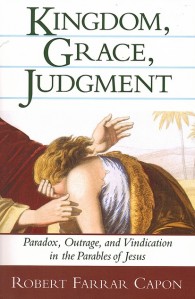
I was going to be excessively picky about what book to first blog about, but rather than become neurotic about the whole thing, I shall just start with the one I’ve finished most recently and be done with it! Yet another worry had to do with posting format and what information to include, but that too became bothersome, so I shall just do something and decide what works later.
Full title: Kingdom, grace, judgment : paradox, outrage, and vindication in the parables of Jesus
Author: Robert Farrar Capon (1925-2013)
Year Published: 2002 (though published as three separate books earlier)
Book Source: Borrowed from the library
Publisher’s summary: “Here in one volume is Robert Farrar Capon’s widely praised trilogy on Jesus’ parables–The Parables of the Kingdom, The Parables of Grace, and The Parables of Judgment. These studies offer a fresh, adventurous look at all of Jesus’ parables, treated according to their major themes. With the same authorial flair and daring insight that have earned him a wide readership, Capon admirably bridges the gap between the biblical world and our own, making clear both the original meaning of the parables and their continuing relevance today.” (From the back cover and, unfortunately, not very helpful)
My thoughts: I had never heard of Capon until he died last month, at which point a few different bloggers and websites mentioned or discussed his work positively, and I decided to look into it. One of my favorite libraries (though not the one I work at) had this omnibus edition, and I originally intended to read just one of the books included in it, but after I got going, I kept going. Though I will admit to hesitating between the second and third volumes for about a week. . .
Capon has an admirably colloquial prose style and a light touch, which suits his theological angle well: though Capon insists he’s no universalist, he leans in that direction, and God’s grace is his central theme. He argues that the salvific work of Christ is automatically applied to all of humanity and that only positive rejection of it is grounds for anything approaching damnation. In his treatment of the three categories of parables, he works from clear paradigms: the kingdom parables are about God’s use of “left-handed power” (weakness and near non-intervention as opposed to the usual “right-handed” sort), the parables of grace are all about death and resurrection, and the parables of judgment proclaim inclusion before exclusion. All these themes weave throughout all the parables, but each category has its strongest thread.
As someone grappling with a number of theological questions, I find his emphasis refreshing, even when I’m not sure if I can take it as far as he does. So I do very much like that he acknowledges where his readers might find their credulity straining and that he is frank about perhaps stretching his points a bit far. Not that I find them in the least bit heretical–in fact, more than a part of me really want this type of thing to be true, and the rest of me is more than willing to acknowledge it as a desirable possibility, if one that seems too optimistic. Regardless, I plan on continuing to peruse Capon’s oeuvre; in fact, I’ve got Between Noon and Three and The Mystery of Christ on my library bookshelf at this moment. So I’m giving Capon and myself plenty more time to question and quibble.
In short: An enjoyable and thought-provoking theological work, well worth the time and any trouble getting a copy.

Pingback: Unapologetic by Francis Spufford | Reading at whim